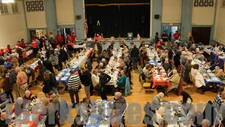Health Focus: Free Skin Cancer Screening12:00AM / Thursday, June 22, 2006
North Adams - North Adams Regional Hospital and the REACH
Community Health Foundation will sponsor a free skin cancer screening clinic on Monday, June 26, and Tuesday, June 27, from 6:30 p.m. to 8:30 p.m. in the new Short Stay Unit on the first floor of NARH.
Reservations Required
Alan N. Binnick, M.D., and Victoria R. Cavalli, M.D., board-certified dermatologists on the NARH Medical Staff, will conduct the screenings for skin cancers including malignant melanoma, basal cell carcinoma, and squamous cell carcinoma.
Free information about skin cancer will be available.
Reservations are required for the clinic. To schedule a screening,
or for more information, call REACH at (413)664-5326. The clinic does not provide a complete body check, but instead is intended to check worrisome lesions.
The incidence of skin cancer has increased in recent years, with
about 800,000 cases of skin cancer occurring in this country each year.
Rise In Malignant Melanoma And Other Skin Cancers
The incidence of malignant melanoma, the potentially lethal form of skin cancer, has increased significantly since 1980. Statistics from the American Cancer Society show the incidence of malignant melanoma is rising faster than that of any other cancer, and that malignant melanoma is one of the most prevalent cancers in the United States with about 62,000 new cases and nearly 8,000 deaths expected in 2006.
In addition, there has been a dramatic increase in lifetime risk of developing malignant melanoma. The American Cancer Society reports that at the current rate, one out of every 100 Americans will develop this form of cancer.
Beware The "Red Zone"
Skin cancer risk can be decreased by minimizing exposure to the sun
between 10 a.m. and 3 p.m. -- the so-called 'red zone' -- when the sun's rays are most intense.
Recommendations include wearing a hat that protects the scalp and
face, clothing that protects the trunk and shoulders, and sunglasses with UV protection. Sunscreen with an SPF (sun protection factor) of 15 or greater should be applied to all exposed areas prior to significant exposure to the sun.
|


















